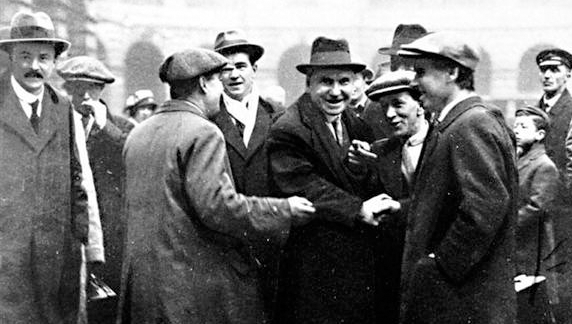John Maclean, a socialist against war

John Maclean was the most significant revolutionary socialist in the English-speaking world during the revolutionary upsurge of the early 20th century. He was feared by the British state, which imprisoned him five times for his political activities. On three occasions he was released early due to popular pressure.
Maclean participated in the Red Clydeside – one of the most radical moments in British history. The working class community near the Clyde River in Glasgow moved into action against the ravages of the First World War and of developing industry, and the pitilessness of the landlords.
Born in 1879, Maclean’s childhood typified the experiences of a whole generation of Scottish families who were driven from the highlands and into industrial cities. His large family fell into near destitution after his father died, but the young John managed to complete his education and trained to become a school teacher.
An avid reader, Maclean stumbled across Marx and found his analysis of capitalism and argument for revolution compelling. He joined the Social Democratic Federation and began teaching classes in Marxism. These classes were held weekly and at times gathered together hundreds of workers keen to soak up revolutionary theory. Unlike other doctrinaire socialists of the day, Maclean threw himself into working class struggles as they emerged.
He was a plain-talking, no-nonsense agitator. What he lacked in poetics, he made up for in forcefulness. Take this section of a letter he wrote to a journal in response to the increasingly pro-war stance of sections of world social democracy:
“The absurdity of the present situation is surely apparent when we see British socialists going out to murder German socialists with the object of crushing Kaiserism and Prussian militarism … Let the propertied class go out, old and young alike, and defend their blessed property. When they have been disposed of, we of the working class will have something to defend, and we shall do it.”
Maclean was one of only a few socialists worldwide who unambiguously opposed the First World War. He agitated ceaselessly against it. Such a stand was not received well by the warmongers and Maclean was tried and convicted twice for his anti-war stand. He refused to be cowed by the attempts at intimidation – but they left physical scars.
The war was difficult on the home front. With many men away at the front, families found it difficult to pay rent – and landlords sucked impoverished families dry. The response from the working class was to organise a rent strike. Many Glaswegian women became political leaders, organising community blockades of houses marked for eviction. Maclean threw himself into this movement too.
The 1917 Russian Revolution found its political echo in Glasgow. Maclean was deeply affected by the events and quickly evolved politically towards Bolshevism. He found agreement with the Russian party over the questions of insurrection, the impossibility of parliamentary solutions to capitalist depravity, the necessity of trade union work and the need for revolutionary organisation.
His stand on these questions and more resulted in the Bolsheviks electing Maclean – along with Lenin, Trotsky, Liebknecht, Adler and Spiridonova – honorary president of the first All Russian Congress of Soviets.
The next years were messy politically. Although Maclean in theory supported the formation of a British communist party, he distanced himself from the project in practice. He was left isolated and politically marginalised.
This was a tragedy both for the party – which lost a talented, sober, committed socialist – and for Maclean, who was divorced from mass politics and suffered an untimely death in 1923. He was only 44 years old.